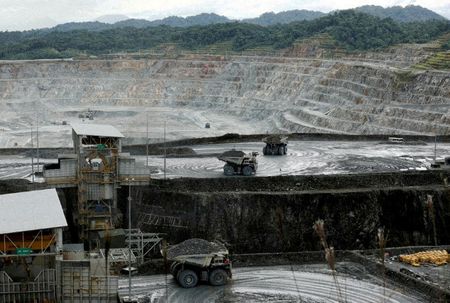By Valentine Hilaire and Divya Rajagopal
(Reuters) – Panama’s top court is likely to rule against Canadian miner First Quantum when it decides on the fate of a key copper mine contract in the coming weeks, a majority of lawyers in a Reuters survey said, citing precedent for a similar verdict.
The court’s nine judges are weighing whether to revoke First Quantum’s contract for the Cobre Panama mine, a significant resource that contributes 5% to Panama’s GDP and 1% to global copper production.
The contested contract, which was approved on Oct. 20, provides First Quantum a 20-year mining right with an option to extend for another 20 years, in return for $375 million in annual revenue to Panama.
However, the contract has faced numerous legal challenges due to protests that claim it favors the miner too much and allege corrupt practices in its approval. Such protests have escalated into an anti-government movement, resulting in two deaths.
The miner’s contract has snowballed into a lightning rod ahead of the May 2024 Panama election. Meanwhile, Standard & Poor’s has revised Panama’s economic outlook to negative from stable due to potential risks to investors’ confidence.
The uncertainty has also wiped about C$8 billion ($5.80 billion) from First Quantum’s market value. Amid the rout, China’s Jiangxi Copper Co Ltd, First Quantum’s biggest shareholder, last week raised its stake in the Canadian company to 18.5%.
Two Panamanian prosecutors have deemed the contract unconstitutional after examining legal challenges submitted to the court.
However, Maritza Cedeno, the president of the country’s bar association, noted that past rulings have deviated from the initial positions of these officials.
She declined to disclose her stance, saying the court should work without pressures.
Four out of the seven lawyers polled by Reuters predicted the top court will nullify the contract, possibly as soon as mid-December. Two others believe the court will uphold the contract, while one remains uncertain.
“There is precedent…,” said lawyer Ariel Corbetti, pointing out that the contract has similarities to the initial First Quantum deal, which was scrapped by the court in 2017.
That contract was inherited by First Quantum in 2013 after it became the operator of the mine. However, Panama’s top court in 2017 deemed unconstitutional the law under which First Quantum was operating the mine.
The ruling was upheld in 2021, resulting in last month’s fresh deal with the government.
A representative for Panama’s top court declined to comment on the possible outcome, and directed Reuters to a statement saying resolving the challenges is the body’s “number one priority.”
First Quantum did not reply to a request for comment on the future of the contract pending court proceedings.
BAN ON NEW MINING LICENSES
Granting a concession requires a public tender, which did not happen with First Quantum, Corbetti said, adding that foreign state-owned entities cannot own mining resources, which he said happens in this case with China.
If the court deems the contract unconstitutional, Panama would be in a tricky spot, lawyers said, as the government on Nov. 3 signed a bill banning all new mining concessions and extensions. That would prevent the two parties from negotiating a new deal.
Panama has issued seven orders to cancel mining concessions to abide by the new law, the trade ministry said last week, without providing detail.
Corbetti also said authorities should seek an agreement with the company for its exit to avoid international litigation.
Panama’s mining chamber has urged against canceling the contract, saying First Quantum could sue Panama for at least $50 billion.
Another lawyer said the court could also move to declare parts of the contract unconstitutional, which would not annul it completely.
Others say the court will rule in First Quantum’s favor.
“This conflict cannot be solved in a temperamental way,” said lawyer Juan Carlos Arauz, former head of the country’s bar association, adding he does not see a scenario under which the court would deem the miner’s contract unconstitutional.
Arauz said revoking the contract would put Panama in a weak spot if the matter goes to international arbitration and could open leaders to litigation.
Lawyer Victor Baker said proper consultations were conducted for the contract’s approval and there was no need for a bidding process since the miner had existing operations, as he expressed confidence in a ruling favoring the company.
($1 = 1.3802 Canadian dollars)
(Reporting by Valentine Hilaire and Divya Rajagopal; Additional reporting by Elida Moreno; Editing by Denny Thomas and Marguerita Choy)

